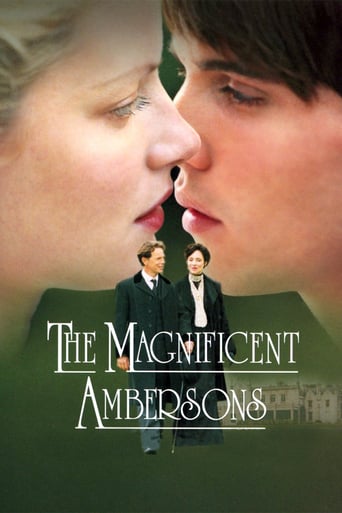

The Magnificent Ambersons (2002)
The spoiled rotten and utterly unlikable rich kid George Amberson becomes horrified when his recently widowed mother rekindles her relationship with the wealthy Eugene Morgan, who she left decades earlier in order to marry George's father. As George struggles to sabotage his mother's new romance, he must deal with his own romantic feelings for Morgan's daughter and the consequences of his meddling as his once great family falls into ruin due to his machinations...
Watch Trailer
Cast


Reviews
Too many fans seem to be blown away
Strong and Moving!
If you don't like this, we can't be friends.
There are moments that feel comical, some horrific, and some downright inspiring but the tonal shifts hardly matter as the end results come to a film that's perfect for this time.
I had to watch this twice before I could finally settle down and enjoy it calmly. The first time I was so disappointed because it didn't begin the same lovely way that the novel & Wells's film did: with that wonderful sentimental prologue of the fashions and the times gone by. (And I would like to know...why didn't it? Is it a tribute to Wells that they didn't feel talented or inspired enough to "pull it off"?)The second time around I "got over that", and managed to keep an open mind. Overall, it was alright, but somewhat stiff and cold. Did they ever consider using at least some of Bernard Herrmann's inspired score? Because the music used was definitely not memorable.Maybe in the end, this makes a better novel than a film; and maybe it was a mistake for Orson Wells to attempt to film it in the first place. As a free TV movie I give it a 7+.It was interesting to see the scenes that were cut in the Wells's film, and the original ending that Tarkington wrote. Much more coherent overall. They made Aunt Fanny more intense than the Wells's version. Apparently, the 1942 preview audience laughed at her hysterics, so some of her scenes had to be re-shot. The farewell walk between George & Lucy was especially well done, and actually better than the Wells's version. Suffers from the apparent overseas location (Ireland). We are obviously not in the Midwest!(Update 8-3-08) Took another look today, much better this time around (a 9). Part of the problem is that us old timers still want to hold on to the myth that Orson Welles's version was a masterpiece...which in reality it wasn't. One thing you do notice is what a dry, quaint tale it really is. More of a "little old lady story" of wayward youth and ultimate redemption, mixed with the changing times of 100 years ago. Very good this time around...enjoyed it a lot...good production values and acting. How could I have been so blind the first times around? Surpasses Welles's version by a mile...!(Update 10-7-17) It occurred to me after all these years that where this production got into problems was by claiming "it was based on a screenplay by Orson Welles". By saying that a lot of Welles fans expected a verbatim reproduction including the third person narrator and the prelude. Instead they skipped that altogether much to a lot of people's initial disappointment. Once you get over that, like I did the second time around, I enjoyed it very much and came to like it a lot.
I thought Jonathan Rhys Meyers performance as the snobbish, bullying, insecure Georgie was great. This guy bases his whole life on being the scion of a wealthy, upper crust family. When his family status drops, Georgie must find himself to escape from his arrogant dependence on his family name. I found the romance between Bruce Greenwood and Madeline Stowe somewhat tepid. Stowe looked old, and hardly the radiant beauty that Greenwood remembers. However the critics who say that Georgie shouldn't have been able to break up his mother's romance don't understand the social climate of the time period. The turn of the 19th to the 20th Century was an interesting time in America. Tarkington's book is about the changing social order, by showing the rise of self-made men over old money and lineage. I thought that was done very well in this production, but based on the other comments I appear to be in the minority.
Of course, even watching the Wells' version was like watching a completely different story than the actual Tarkington novel. The novel is so full of subtlety and nuance (and narration) that I suppose it would be hard for any film to capture it. But this TV flick seems to have been bourne out of some sort of bizarre class called Freud 101. A protective son, yes, but incestuous overtones??? By the way, where is the Midwest? It may have been an affluent family, but early-20th century Indianapolis bore no resemblance to this. Misty moors? Grand hilltop vistas? It's the Midwest for crying out loud! There were wooded estates then as now, but the book is rather specific in describing very public homes that were not removed from the peering eyes of the masses. It was kind of a main point.Now, if one were to simply avoid comparison with the book, I suppose it could have worked rather nicely as a Lifetime/Harlequin movie. The settings, scenes, and costumes were all rather pleasant in an escapist way.
One would think that, given the way A&E was touting "The Magnificent Ambersons," the actual film might be something to sit back and take note of and maybe enjoy just a little bit. The truth is, I've had bikini waxes that were more enjoyable, if only because they didn't last for three hours, like this incessant piece of drivel.The film is marred by five lackluster performances. The unfortunate thing is, they also happen to be the ones with the most screen time. Madeleine Stowe is supposed to be the intriguing, haunted heroine Isabel Minafer, but the only thing that haunted or intrigued me was wondering how much Collagen she must inject to make her lips looks so pouty all the time.Jonathan Rhys Meyers, as Isabel's spoiled son Charlie, is over-the-top and extremely annoying, a little rich boy run amok. His performance also runs amok, to the ruin of the film. You not only want to slap his character for being such a little snot, you want to slap Rhys Meyers for acting so poorly.His obnoxious character makes you wonder why in God's name Lucy Morgan (Gretchen Mol) would even be interested in him. After all, she's the spunky daughter of a self-made man and plays hard to get with all the other boys. But that's about it. Mol gives the character little depth or spark. It's not that she's as bad as Rhys Meyers, but like all of the other performances (save the glaringly bad ones), she's just forgettable.The same could be said for Bruce Greenwood's work as Lucy's father, entrepreneur Edward Morgan. As the man who falls in love with Isabel, Greenwood certainly looks dashing. He's a handsome inventor working in the automobile business, which stick-in-the-mud Charlie thinks is just a passing fad. The forbidden love between Isabel and Edward is supposed to evoke pathos and haunt our souls, but passion never ignites, and though the actors make googoo eyes and send each other love letters, which are ridiculously read straight into the camera by the characters, they never really convince you that they are madly in love.I thought Jennifer Tilly's turn as spinster Aunt Fanny Minafer might provide a respite from the other boring performances, but all she does is further annoy you, if only because of her obnoxious squeaky voice. Aunt Fanny, played by an actress of greater ability, could have been one of the more complex of the film, as she has led a disappointing and unfulfilled life. But like the rest of the character, you find you really couldn't give a rat's about her, either.It seems that Booth Tarkington meant for the title "The Magnificent Ambersons" to be ironic. While they may have loads of money and live in opulence, the Amberson/Minafer family are by no means interesting, exciting, intelligent, or worthwhile, much like most of high society today. They fall from riches to insolvency, while the entrepreneurial class represented by Morgan gains prominence and wealth, which only emphasizes the irony of this title. It seems that Tarkington may have meant his novel to be a commentary of the constant state of flux in which societal structures often are found. But then again, that probably didn't cross the director's or the actors' minds. The film never delves deep into any of these issues.There's nothing magnificent, even mediocre, about this film. It is a waste of time, and A&E is probably realizing, a waste of money as well.




